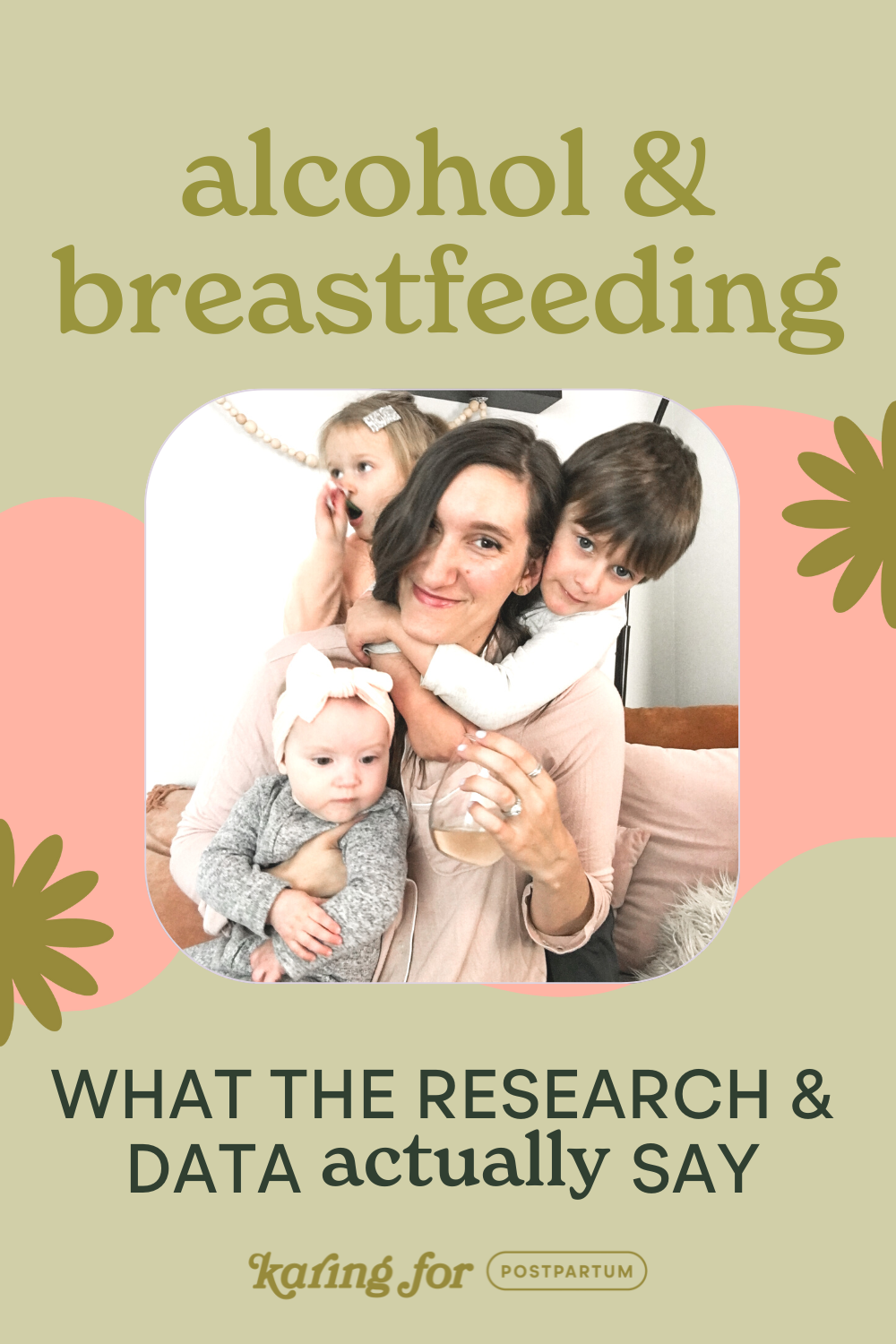What The Research And Data Says About Drinking Alcohol & Breastfeeding
This week we’re tackling another hot topic: alcohol + breastfeeding!
Maybe you’ve got a bachelorette party coming up, a girls’ night out, or you just like to have a glass of wine at night with dinner. Whatever the case may be, today’s blog is applicable to those social and/or occasional moments of alcohol consumption and its impact on lactation and baby!
Previously we talked about breastfeeding & caffeine. Just as there is a lot of old, outdated information about caffeine, spicy foods, and other things consumed while breastfeeding- I’ve also noticed a lot of misinformation regarding alcohol consumption while breastfeeding.
The stigma and outdated advice surrounding this topic is just another layer that I’ve seen further perpetuate the burden of mothers feeling limited when it comes to breastfeeding– when they truly don’t have to be!
Let’s break down the info so that you can make an informed decision and freely choose what you are most comfortable with for you and your family.
As with most things, everyone will have different comfort levels and every baby will respond differently, so take the information here and apply it to yourself and your situation as needed! There is not “only one way” to navigate this.
Let’s get started!
the facts
We’ve learned a lot over the years, and for a long time the “pump and dump” phenomenon has been at the forefront of our knowledge. We know now that it’s NOT necessary to pump and dump and the research supports other options if you’re not comfortable feeding certain milk to your baby. Let’s talk about the data.
Blood Alcohol Concentration
The National Institute of Alcohol Abuse and Alcoholism explains in an article on alcohol & lactation that alcohol moves between the bloodstream and milk to stay balanced. It is then broken down and metabolized by the liver until no alcohol remains. When it leaves the bloodstream, it leaves the milk as well. It does not sit “trapped” in the breast milk.
Blood alcohol concentration (BAC) generally peaks around 30-60 minutes post-consumption per standard drink.
Within the 2 hours after that, the alcohol will begin to level off and excrete from your blood and milk. Of course, this time will be pushed out farther the more drinks you have.
Infant Risk says that moms can resume feeding baby once they feel “neurologically normal” even after moderate drinking.
Different factors may delay excretion or absorption of the alcohol from your blood and milk. This might change the timing of peak level and therefore also delay the excretion process.
Here are some factors that may impact when alcohol clears your milk:
Weight
Food: can delay the absorption and excretion time
Number of drinks: the more you drink, the longer it takes to “clear” from your blood and milk
Metabolism
Impacts On Milk Production
As we increase the alcohol levels by consuming more drinks, it can decrease the hormone oxytocin’s release. Decreasing this hormone can potentially delay or inhibit letdowns when trying to nurse or pump, which would inadvertently result in our baby getting less milk.
One study done by LactMed states that baby’s milk intake could decrease by 20-23% when feeding immediately after alcohol intake.
However, having a drink or two is unlikely to cause this oxytocin inhibition. And waiting the 2 (ish) hours post consumption would lessen the alcohol available to decrease the release of oxytocin. It’s all about timing, baby.
Impacts On Baby
Because alcohol can inhibit oxytocin, you may find baby getting hungrier sooner after feedings when you have consumed alcohol.
It’s totally normal for them to adjust and feed more often to make up for that..
With occasional/social drinking, a minuscule amount of alcohol actually makes it into baby’s bloodstream. The likelihood of baby experiencing any symptoms from alcohol, itself, is minimal. However, here are some things you might notice if you feed baby after drinking:
Increased fussiness/agitation
Difficulty falling asleep
Poor sleep patterns/frequent waking
A minireview on alcohol & breastfeeding done by the Basic& Clinical Pharmacology & Toxicology states that the most likely culprit to these symptoms is caused more so by the decreased milk intake rather than alcohol levels in the baby. **This information is based on the occasional/social drinking we have been talking about. The minireview also addresses impacts on lactation and baby with longer-term/more frequent alcohol use.
These symptoms will not last long, and are not harmful to baby if happening occasionally.
If baby is *frequently* consuming breast milk after mom has been drinking, negative impacts are more likely.
So What options Do You Have?
Okay– feel better? Or maybe you still don’t feel comfortable feeding baby your milk after drinking alcohol? It’s okay!
I promise there are other safe options, and none of them include dumping your milk!
The belief that we need to “pump and dump” puts so much pressure on moms, and it gives the impression that baby will suffer significantly if they consume that milk– when really, it’s likely just fine.
With all of the information we have now, we know it is safe to have occasional and social drinks and still breastfeed our baby as normal.. Even one wild night out isn’t going to hurt your baby!
Here are some options you’ve got:
CDC and FDA recommended 2 hour/drink rule: The “better safe than sorry” approach is to wait 2 hours per standard drink before feeding baby. (IE: Feed baby, immediately have your drink, feed baby at the next feeding).
Feed/pump one hour before drinking: Some studies suggest that pumping an hour before consuming an alcoholic beverage may reduce the milk alcohol levels.
Drink a lot of water and eat to help your body absorb that alcohol.
Feed baby whenever needed and plan on extra feeds as needed
If pumping, some women will mix the milk they pumped after drinking with “safe” milk from the day before to dilute some of the miniscule amount of alcohol (if that feels comfortable to you— I have also done this).
Again, every person is different, and every baby is different. You can choose whatever you feel most comfortable with.
Let’s also debunk the old + outdated trope “pump and dump”. If you’re uncomfortable with the suggestions above and would rather not feed the milk to your baby, here’s a great alternative to pumping and dumping:
If you have milk that you feel uncomfortable using for baby, you can repurpose and use it for something like milk bath bombs instead of dumping!
You could also use this milk to help treat your baby’s eczema, diaper rash, or cradle cap (LINK REEL)
Please, let’s finally ditch the pumping and dumping! There are plenty of other uses for breastmilk aside from consumption!
I hope that this information eases some of your fears and has empowered you to make an informed decision when it comes to alcohol + breastfeeding.
Cheers, Mamas!
Xoxo,
Kar
P.S. Here’s a list of all the resource references from today’s blog:
Alcohol + breastfeeding | Highlight video
Alcohol + breastfeeding | Instagram Post
“Alcohol & Breastfeeding: What’s your time-to-zero?” | Infant Risk Center
This link has a “standard drink” chart as well as a “time-to-zero” calculator you can use to estimate when your BAC would be zero.
Alcohol Consumption in Lactating Women | National Library of Medicine
Alcohol & Lactation | LactMed
“Alcohol’s Effect on Lactation” | National Institute on Alcohol Abuse and Alcoholism
“Alcohol & Breastfeeding” | Basic & Clinical Pharmacology & Toxicology
Was this helpful? Save it for later!






